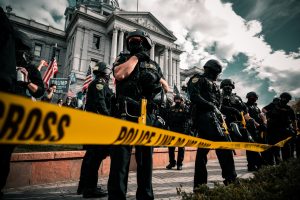 Police officers play a critical role in maintaining law and order in communities across the country. However, not all police officers receive the same training. In fact, there are significant differences between the training that state police officers receive versus city police officers. Understanding these differences is important for both law enforcement professionals and members of the public.
Police officers play a critical role in maintaining law and order in communities across the country. However, not all police officers receive the same training. In fact, there are significant differences between the training that state police officers receive versus city police officers. Understanding these differences is important for both law enforcement professionals and members of the public.
2State Police Training
State police forces are responsible for enforcing state laws throughout their respective states. The training that state troopers receive is typically more specialized than that of city police officers, as they are often tasked with specific duties such as highway patrol or investigating major crimes.
The length of state police training can vary depending on the state and its requirements, but it generally lasts several months to a year or more. In addition to traditional classroom instruction, state trooper candidates must also complete rigorous physical fitness tests and firearms training.
One of the most notable differences between state police and city police training is that state troopers often have access to specialized units such as SWAT (Special Weapons and Tactics), K-9 units, and bomb squads. These units require additional specialized training beyond what is typically required for general policing duties.
City Police Training
City police forces are responsible for enforcing local laws within their jurisdictions. Unlike state troopers who may be assigned to specific roles, city police officers must be prepared to handle a wide range of situations from traffic stops to violent crime investigations.
The length of city police officer training can also vary depending on the department’s requirements, but it typically lasts several months to a year. City police officer candidates must also complete physical fitness tests and firearms training.
City police officers tend to focus more heavily on community policing tactics than their state counterparts. This means that they work closely with residents in their jurisdictions to build relationships and prevent crime before it happens.
Comparing State and City Police Training
While there are certainly differences between how state troopers and city police officers are trained, there are some similarities as well. For example, both types of law enforcement professionals must pass background checks before being hired into their respective positions.
However, where they differ significantly is in areas like specialized unit access and community policing tactics. A major factor driving these differences is funding – many larger cities have more resources available to invest in community policing programs whereas rural areas may prioritize more specialized units like SWAT teams due to lower call volume but higher risk incidents.
Another key difference between these two types of law enforcement agencies lies with jurisdictional authority – while city forces have authority over local laws within specified boundaries, State Troopers have much broader authority over multiple counties or even statewide if necessary.
Conclusion
Understanding how different types of law enforcement agencies train their officers is critical for both professionals in the field as well as everyday citizens interacting with them on a daily basis. While there are certainly similarities between how state troopers and city police officers are trained (such as background checks), there are significant differences too — especially when it comes to access to specialized units or community policing tactics used by each agency type based on funding availability or jurisdictional scope respectively. By understanding these nuances better we can all work together towards building safer communities where everyone feels protected under fair application of our laws regardless where we live or travel through!


